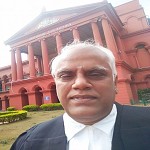GENERAL QUESTION
 RAVI PARKASH JANGID
(Querist) 18 October 2010
This query is : Resolved
RAVI PARKASH JANGID
(Querist) 18 October 2010
This query is : Resolved
CAN A GOVERNMENT PERMANENT EMPLOYEE STUDY IN LAW (REGULAR)
 Devajyoti Barman
(Expert) 18 October 2010
Devajyoti Barman
(Expert) 18 October 2010
No, it is prohibited. He however can study such law courses which are not recognised by the Bar Council of India.
 R.Ramachandran
(Expert) 18 October 2010
R.Ramachandran
(Expert) 18 October 2010
There is no bar for a government employee to study regular law course. He has to obtain permission from his controlling authority to join the course.
However, what will be difficult is that there is requirement for minimum percentage of Attendance. If he is a regular employee, and has not availed leave on those days, he cannot be shown as present in the College (Course) to satisfy the attendance requirement. This attendance requirement is a must for sitting in the examination and also for the purposes of enrolment before the State Bar Council later on.
However, if there are colleges running morning or evening regular LLB Courses (for instance in New Delhi we have course that is run by Delhi University in the evening time between 6.00 p.m. and 9.00 p.m. and most of the persons who attend the course are Government servants), then you can try for that.
 Parthasarathi Loganathan
(Expert) 18 October 2010
Parthasarathi Loganathan
(Expert) 18 October 2010
I fully endorse the views of Shri R.Ramachandran. At the same time, we find that though the employer issues NOC to its employees to study law, they are not allowed to practice law even on part-time basis even on the basis of undertaking letter assuring that his professional practice will in no way hinder or act detrimental to the interests of his employment. This must change so that efficient legal brains can contribute to speedy disposal of cases gripping our country.
 R.Ramachandran
(Expert) 18 October 2010
R.Ramachandran
(Expert) 18 October 2010
Many things that come as an impediment in permitting the employee to practice law by the Government are as follows:
(1) There is a clear bar in the BCI Rules prohibiting a person who is in full time or part time service to practice law.
(2) Though the government employee may say assure that he will do professional practice without detriment to his official duties; it is very hard to practice. There will definitely be split sincerity. Personal work taking precedence over official work cannot be ruled out altogether. Further more, there is also no guarantee that the employee would not use his official position to canvass for clientele. There are scores of other reasons as well.
 Parthasarathi Loganathan
(Expert) 18 October 2010
Parthasarathi Loganathan
(Expert) 18 October 2010
Mr.Ramachandran has opened up an healthy debate which has to take lead out of the purview of text books or theory. Let us imagine some scope for development proposing sincere improvements in age old extant law as:
(a) Just because it is a part time or full time practice of law by employed law graduates it does not mean that they will devote scant attention. This version is equally applicable to full fledged practitioners of law.
(b) Professional sincerity can never be generalised and can vary from person to person.
(c) Official position can in way help to canvass clientele when you happened to be a part of an organised structure.
(d) Personal influence of legal process can also be envisaged even when you are not a part of a Government Organisation.
(e) BCI Rules imposing bar needs to be thoroughly reviewed in the context of the present scenario.
(f) There is no clear definition for personal work and official work in any legal context.
I always stand corrected.
 R.Ramachandran
(Expert) 18 October 2010
R.Ramachandran
(Expert) 18 October 2010
Either I have not made myself clear or Mr. Partha has completely misunderstood what I said.
(1) (a)and (b): I never raised any question about professional sincerity. Rather what i said was that the Government always fears, and rightly so, that a person's interest in practising law would result in dilution of his attention to his official duties (and not vice versa).
(2) It is true that due to personal influence one can get clients and that is how practising advocates are getting. But when a government servant is getting clients it will be very difficult to ward of the criticism from the public that but for using his official position he could not have got the clients etc.
(3) When i said 'personal work' I meant the legal work that would be performed by a government servant if permitted to do so, and not segration of his personal work and legal work.
 Parthasarathi Loganathan
(Expert) 19 October 2010
Parthasarathi Loganathan
(Expert) 19 October 2010
Thanks for clarification. Let us get back to address the main issue posted by the author. Studying Law for the sake of obtaining degree amounts to fruitless exercise unless the extant laws are made flexible to suit the present day scenario.
 RAVI PARKASH JANGID
(Querist) 18 October 2010
This query is : Resolved
RAVI PARKASH JANGID
(Querist) 18 October 2010
This query is : Resolved
 R.Ramachandran
(Expert) 18 October 2010
R.Ramachandran
(Expert) 18 October 2010
 R.Ramachandran
(Expert) 18 October 2010
R.Ramachandran
(Expert) 18 October 2010
 R.Ramachandran
(Expert) 18 October 2010
R.Ramachandran
(Expert) 18 October 2010
